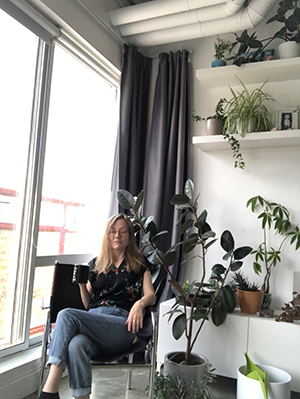An Invitation to Persist: Jolene Loveday interviews Domenica Martinello

Volunteer Jolene Loveday talks with Domenica Martinello, one of two winners of our 2023 Long Poem Prize with her poem, “Good Want” (featured in summer issue #223). They discuss Domenica’s upcoming book, the shifting delineations of “good” and “bad,” and populating poems with the sumptuous trash of life.
Domenica Martinello, from Montreal, QC, is the author of All Day I Dream about Sirens (2019). She holds an MFA from the Iowa Writers’ Workshop, where she was the recipient of the Deena Davidson Friedman Prize for Poetry. Martinello was a finalist for the 2017 RBC Bronwen Wallace Award for Emerging Writers, and served as a judge for the award in 2021. Anthologized in Best Canadian Poetry 2019, Martinello's new work has appeared or is forthcoming in Black Warrior Review, Electric Literature, carte blanche, The Walrus, Maisonneuve, Arc Poetry Magazine, Poetry Northwest, The South Carolina Review, and elsewhere.
[photo credit Vincenzo D'Alto]
“Good Want” seems in part to comment on the complex guilt that can accompany upward mobility, ascendence—a wanting that is ironically “good,” yet somehow sheared off from a conventional notion of goodness. The piece ends on a hopeful note: “Continue kneading the world / with my small, specific life.” Is this an invitation?
Yes, an invitation to live joyfully within meagreness. By the end of the poem, I mean this in a more existential sense. All of humanity is nothing more than an eyelash on the cheek of the universe—smaller even, a mite on an eyelash. Regardless of scale and significance, we persist in needing (and kneading) the world, shaping it, even if the impressions we make are technically pretty insignificant. So I guess it’s not only an invitation to persist, but to delight in the folly of wanting to persist in spite of all that.
But to go back to something you mentioned, you’re right to pick up on the complex feelings of guilt and shame associated with upward mobility—both wanting it in the first place, and then attaining some version of it. Financial struggle is a catalyst for the poem to unravel other ways to engage with (and survive) a “lack of means.” The speaker lacks the spiritual means necessary to find hope in God, struggling to confront people’s shifting delineations of “good” and “bad.” Relatedly, she also recognizes language’s inability to express the inexpressible. Words lack the means, too.
I adore the many humorous, irreverent lines in “Good Want,” such as “What I want is generic. // A good, cheap stretch. / Nylon, spandex, whatever / the hell jeggings are made from.” What techniques do you employ to balance moments of levity and solemnity in the long poem form?
Thank you! People finding me or my writing funny is my favourite compliment. Dealing with solemn or vulnerable subject matter can feel tight and uncomfortable, so my impulse is usually skewed towards humour to deflate some of the air in the balloon. For me, achieving the right balance consists of ensuring that I’m not using irreverence as an avoidance tactic. I’ve come to realize that sometimes my desire to be funny in a poem is actually a sign I need to sit with discomfort for longer.
As for techniques, being unhurried affords me critical distance. I write slowly, tinker slowly, then put poems away for months at a time before coming back to revise them. By this point, they feel cool to the touch and can be handled with less preciousness. It’s usually at this point where I can see if humour is working for, or against, what I’m trying to do.
I like the lines you mentioned because I like populating poems, even the most solemn, with the sumptuous trash of life. Jeggings deserve their place on the poetic record!
You have chosen to group lines into shorter stanzas. In several sections, you have also made generous use of white space. How does this kind of compression—and its resultant absence—serve your intention for the piece?
The speaker in “Good Want” circles around descriptions of intergenerational trauma—namely, versions of episodes from my parents’ childhoods that went largely unacknowledged or unexamined for the majority of my life. There’s also a vast sense of powerlessness; the inability to diminish the harm that’s occurred and its ramifications, even if you’ve managed to break parts of the cycle.
A long poem provides a sense of duration, and I also wanted to convey endured silence through the white space. The blankness also ties back to meagreness and smallness. What we don’t know will always far exceed what we know and can express.
At the time of this interview, it’s the start of summer. Do you gravitate to “lighter” reads (e.g., the classic beach book) or to something else this time of year? Do the seasons influence your reading choices and habits?
I don’t think so! The biggest influence on my reading habits has been purchasing an e-reader last year to make it easier to read in bed with the lights off. Now I’m always reading a daytime and a nighttime book. After making the mistake of having Blood Meridian by Cormac McCarthy (R.I.P. king) find its way onto my e-reader as my nighttime book, I usually make some passing effort to ensure I’m not reading anything too gruesome before bed. But otherwise, there’s no rhyme or reason attached to the seasons.
I read that you are working on a new poetry manuscript. How is the process of compiling this book different from writing your first collection, All Day I Dream About Sirens, published prior to the pandemic in 2019? What are you learning this time around?
Thank you for asking. My next book Good Want, that shares the same title as the winning poem, is forthcoming in spring 2024. A while back I saw a Goodreads review for All Day I Dream About Sirens that I’ve held close as I was working on new stuff: “I didn’t like this at all until I read the notes. Very redeeming.”
ADIDAS has, like, three pages of detailed notes for added context—and it could have been longer. It’s a book that’s overflowing with literary allusions, riffs on pop culture, bible references, historical scraps, manipulated mythologies, various adopted personas both real and fictional, and lots of other bric-a-brac. It’s also a book that I completed during my MFA, a specific bubble of time where I could indulge and rehearse every poetic whim repeatedly to a captive audience that’s likely read Joyce.
Remixing the literary detritus floating around in my head at any given time? That’s my comfort zone. And don’t get me started on how much I love an overarching theme! So to push my work to the next level, I challenged myself to write poems that stand in their power (or their silliness or their weirdness or whatever) without the need for a redeeming notes section. That’s been the learning process.

Jolene Loveday
* * * * * * * *









